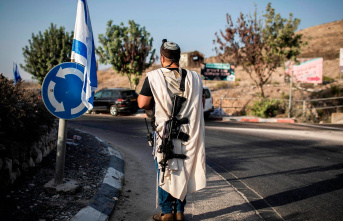In the small town of Bucha, with its high-rise buildings and wide streets, sadness and pain are almost palpable, even a year after the Russian troops left. At St. Andrew's Church, where many civilians were found in mass graves, Priest Andriy Halawin of the New Orthodox Church of Ukraine leads mourning ceremonies for those currently killed in the war. In many churches the memory of the anniversary of the Bucha massacre is mixed with the farewell to fallen soldiers.
In the cemetery on the outskirts of the village with its once 36,000 inhabitants there are also anonymous graves of unidentified dead. Blue and yellow flags of Ukraine fly at many other resting places, along with photos of the country's fallen defenders.
Bucha, a good half hour from the capital Kiev, stands for the atrocities of war like no other place. On the way there, the traces of the fighting of the Ukrainian troops against the Russian army are unmistakable: the buildings are destroyed, there are bullet holes, shattered windows and smashed roads.
A year ago, on April 2, just days after the Russian withdrawal, pictures of corpses on Jablunska Street also went around the world. It is far away from the center of Bucha in a settlement with small houses and manageable lots. Some of the dead had their hands tied behind their backs. A dead man lay next to his bike. A year later, there is hardly anything left of the scenes of violence on the street. Bullet holes on fences and buildings are evidence of fighting. The street is deserted.
Hundreds of civilians killed in Bucha
According to various sources, either 422 or 461 civilians were killed in Bucha alone. Prosecutor General Andriy Kostin even speaks of 700 people who died after the Russian invasion. Kostin also reports that 91 Russian soldiers have already been identified and are said to have been involved in the more than 9,000 war crimes registered in Bucha district. "Torture, murder, sexual violence. This is the true face of the 'Russian world' and the regime of the Russian Federation, which is based on total disregard for human rights principles," Kostin said in February.
According to police chief Andriy Nebytov, 1,444 bodies of civilians were found throughout the Kiev region by the beginning of March this year. Almost 200 bodies could not be identified. "We take the DNA, process all missing persons reports and contact the relatives and try to identify them," Nebytov told Ukrainian public television.
A year later, Ukraine is again commemorating the crimes with haunting videos. On the anniversary of the beginning of the war on February 24, President Volodymyr Zelenskyj Bucha described it as his personally worst experience of the war. A year ago, after the withdrawal of Russian troops, the leadership in Kiev showed the corpses. State guests from abroad visited the place where emergency services pulled the bodies in black sacks from the graves.
Selenskyj on a visit to Butscha
"Events that could not have been imagined in the 21st century became a reality in the Bucha and Irpin suburbs of Kiev," says Zelenskyj on the anniversary of the massacre. "However, the liberation of the Kiev region became a symbol that Ukraine can win this war." On Friday he also visited Butscha himself with state guests and honored soldiers with medals.
The Ukrainian Post, which consistently immortalizes Kiev's triumphs on postage stamps, presented several stamps on Friday. The motto of the stamps: "No Forgive! No Forget!" A photo of a destroyed Russian military column on Bahnhofsstrasse in the small town is shown on the stamp as a symbol of Butscha.
The images of horror are omnipresent, the evidence from the point of view of human rights activists is overwhelming. There are countless allegations against the Russians, including murder, torture, rape. Despite this, Russia, which invaded Ukraine on February 24, 2022, has denied committing war crimes even on the anniversary.
Russia speaks of staging
In a lengthy statement, Russian Foreign Ministry spokeswoman Maria Zakharova once again claimed that it was a staging to prevent a diplomatic solution to the conflict. At the time, Russia had shown itself openly during negotiations in Turkey and, as a sign of this, withdrew its troops from the Kiev region. "In response, the Ukrainian leadership staged the crude and cynical provocation in Bucha."
Despite Russian demands, there are no official lists of names or forensic reports on the civilians "whose bodies were shown on the streets," said Zakharova. She described the photos published on the Internet and social networks as manipulation. "The Zelenskyi regime has something to hide."
It is clear that the people in Bucha would still be alive without the Russian invasion. In the St. Andrew's Church, Priest Halawin only has to mourn and pray - for a victory for the country against the Russian occupiers. He stands by the open coffin of a fallen soldier. Dozens have come to say goodbye to Ihor Dyukaryev, his mother and widow kiss the dead man.
The 24-year-old was killed in fighting near Dibrova in the Luhansk region on February 20. As a child, he fled to Bucha in 2014 from the Donbass fighting with his mother and sisters. On February 24, 2022, he volunteered when war broke out and was the youngest in his unit. A year later, on February 25, he was buried at the Bucha cemetery by soldiers in uniform. Many of them let their tears flow freely.











